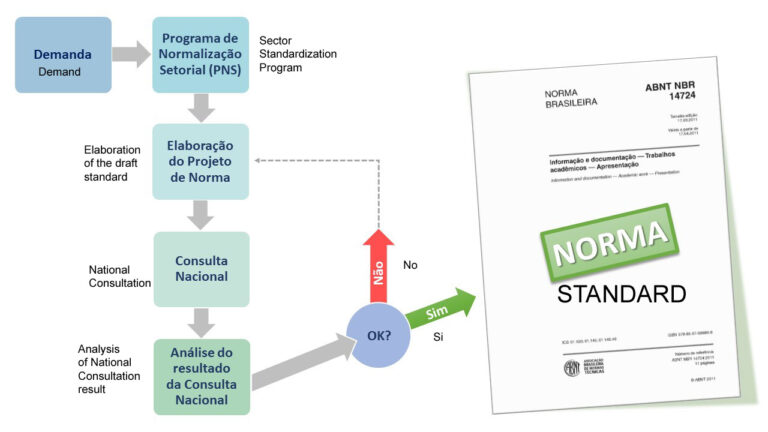The Brazilian Association of Technical Standards or ABNT is a private, non-profit entity that takes care of different regulations in the country. In other words, it studies and proposes ways to systematize processes, be they academic, technological, industrial, service production, among others.
ABNT was created on September 28, 1940 as a standardizing entity. Ten years later, it expanded its activities and also began to certify organizations, products and services that followed certain standards of quality and efficiency.
Today, the organization's guidelines are recognized by the Federal Government and followed by companies and academic entities from all over Brazil. Each standard is created through commissions or committees formed by people who have technical knowledge in different areas of expertise.
ABNT is so important that it is one of the founders of ISO or International Organization for Standarization. This is an entity that brings together more than 160 countries and makes standards with international validity.
As an ISO member, you have some important duties, such as respecting the rules established for ISO members for sales and distribution of ISO standards and National Adoptions, and also looking after the ISO brand in Brazil.
In addition, ABNT also represents Brazil in international forums such as ISO. Its mission is to ensure that the position of all Brazilian sectors is taken into account in the development of international standards.
imagem link: abnt.org.br/normalizacao/elaboracao-e-participacao/como-se-elaboram
Each norm arises through a need of society. A citizen, a company or a group of people can contact ABNT and inform that it is necessary to standardize a certain process. The matter will be analyzed and taken to a Technical Committee.
Committee members will discuss the problem in an open session for anyone. When a consensus is reached, a Draft Standard is created or the request is filed.
There is also the work of internalizing international standards where international standards receive the Brazilian version. This version can be identical or modified. It is important to note that even the identical versions are not necessarily translations of the standards, the commission is free to write the standard as clearly as possible in the national context, even if it changes the words used in the original standard. The result of this work also becomes a draft standard that will be discussed in an open session and reaching a consensus the standard is sent for publication as ABNT NBR standard.
On the ABNT website, it is possible to access the list with all the standards created between 2009 and 2019. However, to read the content of each one of them, it is necessary to buy the material through the ABNT Catálogo website.
Publication of ABNT standards
The Draft Standard, prepared by a Study Commission representative of the stakeholders and sectors involved with the topic, is submitted to the appreciation of society, through the National Consultation.
In this process, the Draft Standard, prepared by a Study Commission representative of the stakeholders and sectors involved with the topic, is submitted to the appreciation of society for a pre-established period where any interested party can manifest, without any burden, in order to to recommend to the Study Commission the approval of the text as presented; approval of the text with suggestions; or its non-approval, and, for that, must present the technical objections that justify its manifestation.





